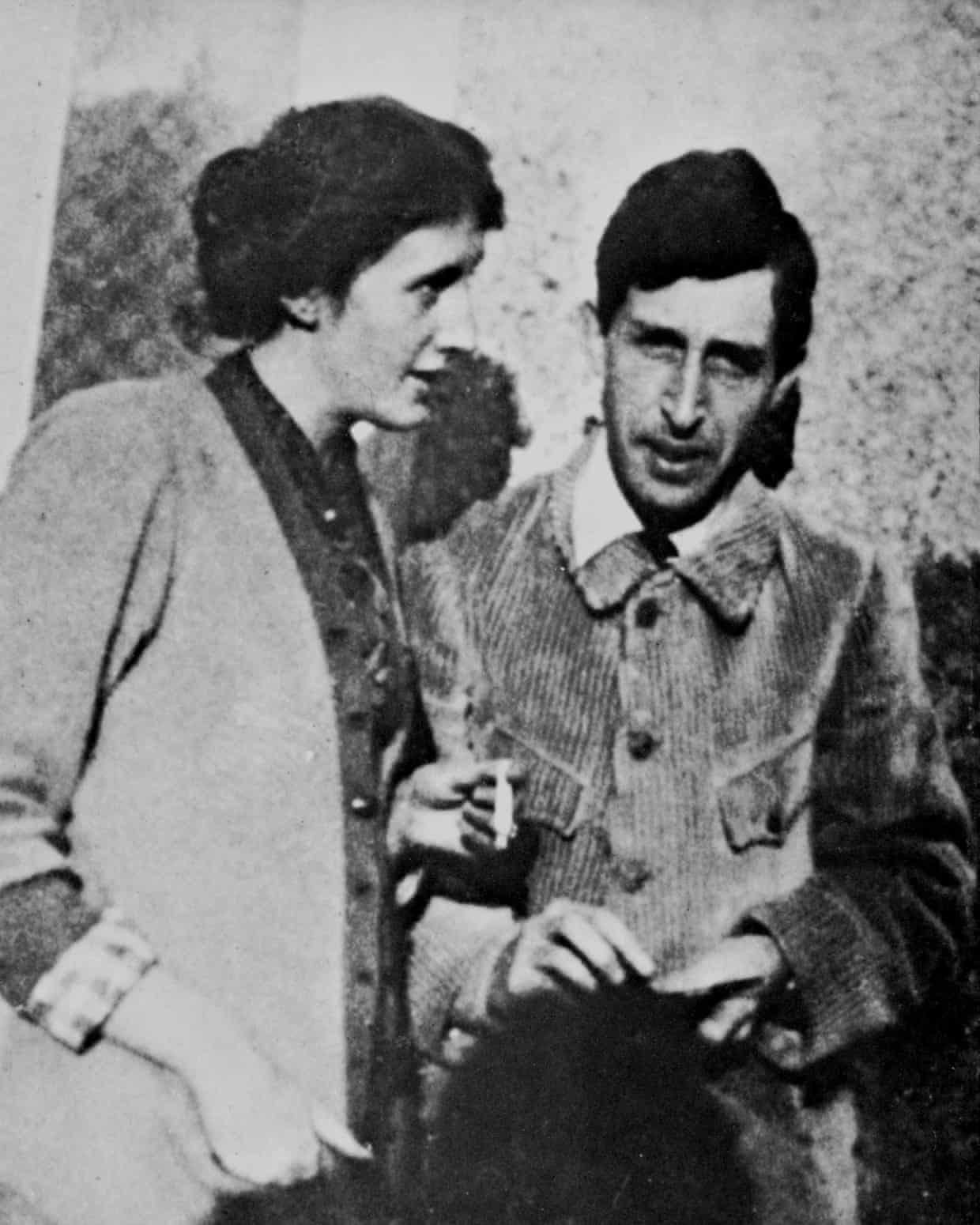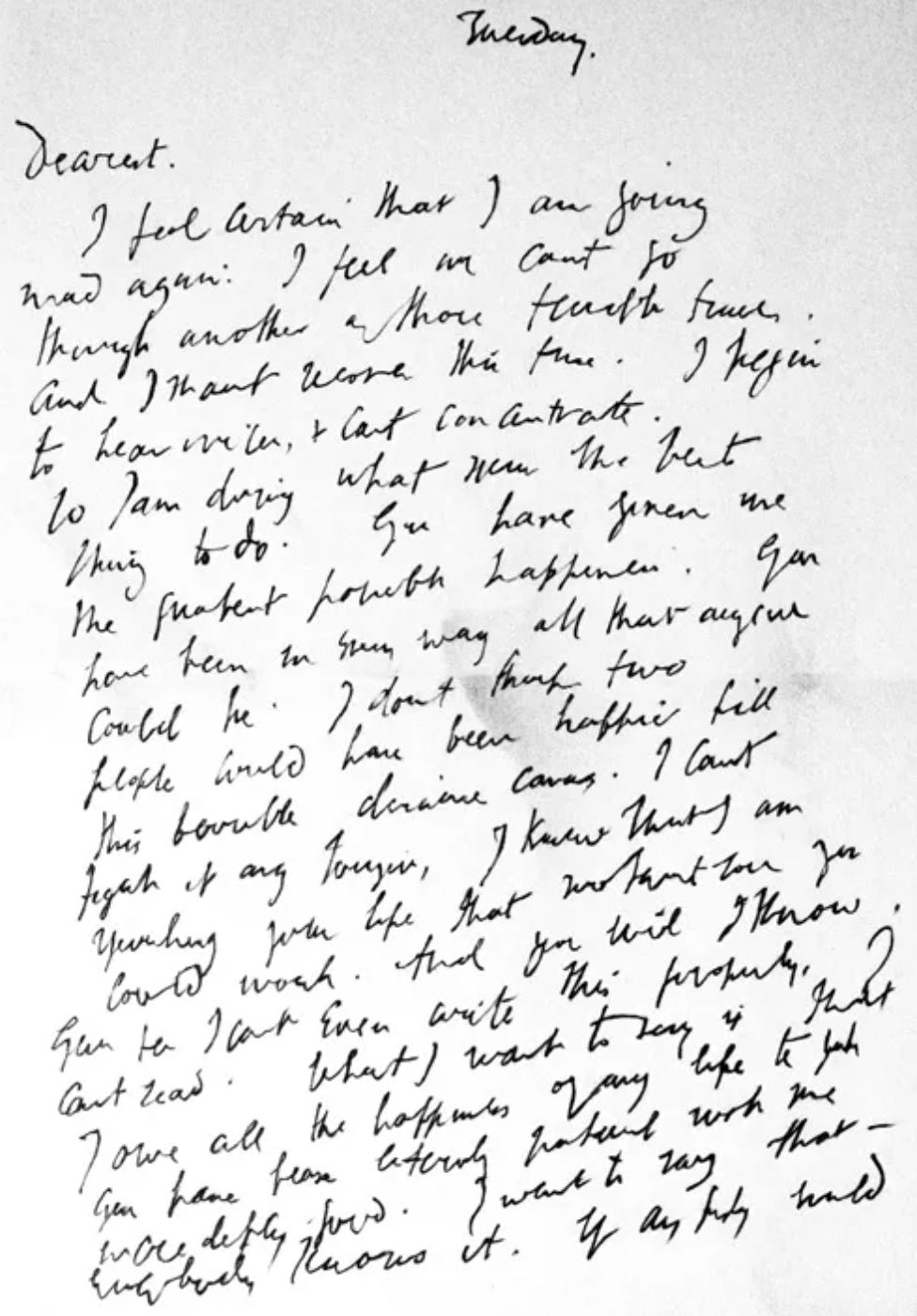You probably already know how unreliable the media can be. But imagine the press purposefully distorting someone’s suicide for the purpose of generating clickbait.
It happened to someone you’ve probably heard of: Virginia Woolf.

Virginia Woolf’s suicide
Virginia Woolf was a writer, best known for works like Mrs. Dalloway, To the Lighthouse, and Orlando. In 1941, she filled her coat pockets with stones and drowned herself in the river Ouse near her home. She was 59 years old.
It is illustrative to see how some members of the British press distorted Woolf’s suicide letter, which had been left for her husband Leonard Woolf.
Here’s an image of the letter:
Here’s the text of the letter:
I feel certain I am going mad again. I feel we can’t go through another of those terrible times. And I shan’t recover this time. I begin to hear voices, and I can’t concentrate. So I am doing what seems the best thing to do. You have given me the greatest possible happiness. You have been in every way all that anyone could be. I don’t think two people could have been happier till this terrible disease came. I can’t fight any longer. I know that I am spoiling your life, that without me you could work. And you will I know. You see I can’t even write this properly. I can’t read. What I want to say is I owe all the happiness of my life to you. You have been entirely patient with me and incredibly good. I want to say that — everybody knows it. If anybody could have saved me it would have been you. Everything has gone from me but the certainty of your goodness. I can’t go on spoiling your life any longer.
I don’t think two people could have been happier than we have been.
How the media distorted Woolf’s suicide note
According to Woolf’s husband, her statements, “I feel certain I am going mad again. I feel we can’t go through another of those terrible times,” referred to Woolf’s earlier bouts of depression. But the press changed “those terrible,” to “these terrible times,” to make it sound like she was referring to World War II.
Here’s the article about her suicide in the Evening Despatch:
Notice how the title said “Can’t go on these times.” Moreover, they said that the coroner said: “Woolf was undoubtedly of an extremely sensitive nature, and was much more responsive than were most people to the general beastliness of things happening in this world to-day.”
In other words, Woolf killed herself because she was so sensitive to the world events of the day.
Here’s how her suicide was reported on, in the Derby Evening Telegraph:
Again, she was quoted as saying “I cannot go on any longer in these terrible times,” and the article states that “She was undoubtedly of an extremely sensitive nature, and was much more responsive than were most people to the general beastliness of things happening in this world to-day.”
And here is the Gloucestershire Echo, saying similar things:
By the way, this was tweeted by The British Newspaper Archive in 2014, which unfortunately helps keep the narrative alive:
FYI, you can search for these articles in the The British Newspaper Archive.
Woolf’s husband tried to fact-check the newspapers
Woolf’s husband, Leonard Woolf, tried to fact-check newspapers with the following:
I feel that I should not silently allow to remain on record that Virginia Woolf committed suicide because she could not face the “terrible times” through which all of us are going. For this is not true… Then newspapers give her words as:
“I feel that I am going mad again. I feel we can’t go through another of those terrible times.”
She had had a mental breakdown about twenty-five years ago; the old symptoms began to return about three weeks before she took her life, and she felt that this time she would not recover. Like everyone else, she felt the general strain of the war, and the return of her illness was partly due to that strain. But the words of her letter and everything which she has ever said prove that she took her life, not because she could not “carry on,” but because she felt she was going mad again and would not this time recover.

But the damage had been done, and Woolf’s suicide was spun as an act of unpatriotic cowardice. Apparently, the attacks continued in the press for more than a year.
Tweeting, before Twitter
Some people had some self-righteous things to say about Woolf based on the media spin. For example, The Sunday Times ran this letter by a Mrs. Kathleen Hicks, wife of the Bishop of Lincoln:
Sir, — I read in your issue of Sunday last that the coroner at the inquest on Mrs. Virginia Woolf said that she was “undoubtedly much more sensitive than most people to the general beastliness of things happening in the world to-day.” What right has anyone to make such an assertion?
If he really said this, he belittles those who are hiding their agony of mind, suffering bravely and carrying on unselfishly for the sake of others. Many people, possibly even more “sensitive,” have lost their all and seen appalling happenings, yet they take their part nobly in this fight for God against the devil.
Where are our ideals of love and faith? And what shall we all be if we listen to and sympathize with this sort of “I cannot carry on?”
One can easily imagine this person excoriating people on Twitter had she been alive today.
Coincidentally Woolf’s anti-war friends had been pilloried in the media
There’s an added twist.
Before she died, Woolf’s circle of friends and acquaintances had been under attack by the media because they had opposed the First World War. These were writers, artists, and intellectuals who had warned of the dangers of the Versailles Treaty, the rise of extremism and militarism, and the risks of appeasing Hitler.
In other words, they were anti-war dissidents. Does any of this sound familiar?
The media has always been full of distortions. Remember that now, whenever inconvenient people are excoriated or painted as racist or misogynistic or anti-science or whatever. It’s not that these labels never apply to anyone—of course they do. But the media’s spin on them cannot be relied upon.








A very interesting article, thank you. What a heart wrenching letter even her writing appeared distraught and you can feel the emotional turbulence she was going through. Just a few words changed in her letter, she would have hated that to have happened as the written word was her life's work and it seems to me to be a betrayal of her life and death to have distorted the meaning of her words.
Thank you for digging in the past and showing people the things they do not know. Even back in 1883 the press did not share facts. It shared the fiction of the owners. https://archive.org/details/no-such-thing-as-a-free-press-1883